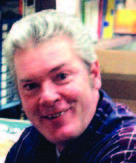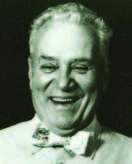Jack Spangler
 William Jack Spangler, whose affiliation with Johns Hopkins spanned 45 years, died on September 16, 2007 at the age of 62. Spangler began at Hopkins in a work/study position during his senior year of high school and was hired by the Department of Physics immediately upon his graduation in 1963. In 1995, he transferred to the Department of Civil Engineering, where he remained as a senior instrument designer until his retirement last August. He received the Whiting School of Engineering’s Outstanding Staff Service Award in 2002.
William Jack Spangler, whose affiliation with Johns Hopkins spanned 45 years, died on September 16, 2007 at the age of 62. Spangler began at Hopkins in a work/study position during his senior year of high school and was hired by the Department of Physics immediately upon his graduation in 1963. In 1995, he transferred to the Department of Civil Engineering, where he remained as a senior instrument designer until his retirement last August. He received the Whiting School of Engineering’s Outstanding Staff Service Award in 2002.
“Jack was truly gifted,” says Nick Jones, dean of the School of Engineering, who worked with Spangler on numerous bridgerelated research projects over more than a dozen years. “He had a tremendous gift for understanding electromechanical systems, and would diagnose and repair complex missioncritical systems in a calm, unflappable manner.” Says Spangler’s former colleague Emeritus Professor Aihud Pevsner from the Department of Physics and Astronomy, “Jack could reassemble a television set in the time it took me to cough.”
“Jack was always working in the background,” says Jones, “and his commitment to delivering the highest quality product has strongly influenced the careers and lives of many Hopkins faculty and students.”
Bob Pond
 Robert B. Pond, an emeritus faculty member who taught at Johns Hopkins from 1947 until his retirement in 1998, died on October 5, 2007.
Robert B. Pond, an emeritus faculty member who taught at Johns Hopkins from 1947 until his retirement in 1998, died on October 5, 2007.
Pond was devoted to teaching, research, consulting, and lecturing in the field of physical metallurgy. He was also known to generations of students for the bow ties he fashioned out of aluminum for himself and each new professor in the department.
Bob Green, who recently retired from the Materials Science and Engineering Department, recalls his colleague and friend of more than 40 years with whom he founded the department in 1983. “Bob Pond was one of the best teachers at Hopkins Engineering. He knew all the things that are in the books but he also knew the practical side of things from his industry experience at Bethlehem Steel. He was friendly and enthusiastic and as a teacher he was very approachable. All the students loved him. He taught me most of what I know and was a wonderful mentor and friend.”
Pond’s research involved solidification phenomena, the practice of cire perdue casting and growing multiple metallic single crystals in a single mold. For many years, Pond studied the nature of ductility at deformation rates exceeding the velocity of sound in metals and alloys and the deformation of single crystals on a microscopic scale. He took the first high magnification movies of slip bands forming and propagating during tensile formation, using a technique he christened “cinemicrography.”
Dean Nick Jones notes that Pond’s dedication as teacher and scholar continues to be recognized through two awards at the Whiting School: The Robert B. Pond Senior Achievement Award and the Robert B. Pond Excellence in Teaching Award.




